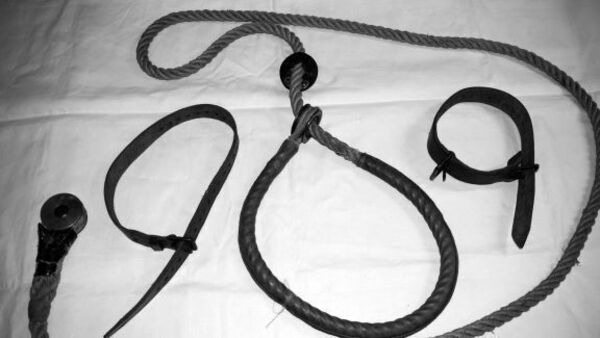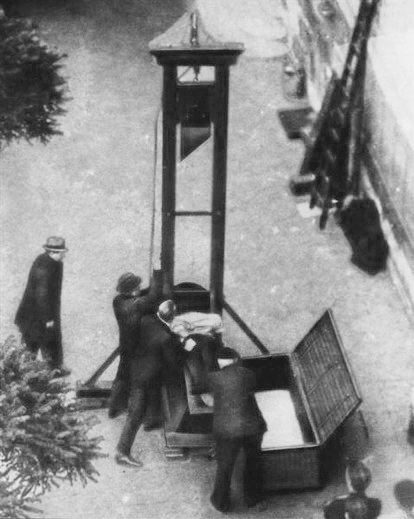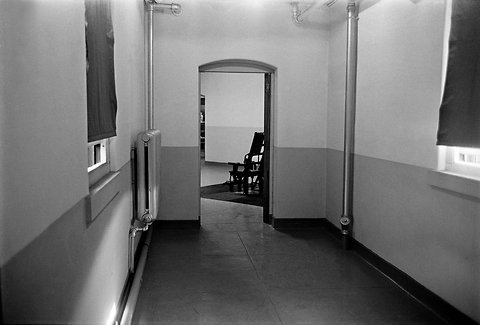Your cart is currently empty!
On This Day in 1953 – Louisa Merrifield, the Blackpool Poisoner.
It’s a fact that, for all their ruthlessness and guile, murderers can and do make the most idiotic mistakes. Louisa Merrifield was certainly one of them. Born in 1906, Merrifield was a liar, a fraudster, a cheat and ultimately a murderer. Today in 1953 her criminal career ended abruptly at the end of Albert Pierrepoint’s…

It’s a fact that, for all their ruthlessness and guile, murderers can and do make the most idiotic mistakes. Louisa Merrifield was certainly one of them. Born in 1906, Merrifield was a liar, a fraudster, a cheat and ultimately a murderer. Today in 1953 her criminal career ended abruptly at the end of Albert Pierrepoint’s rope. She was the third-to-last woman to hang in Britain and the fourth to die at Strangeways, a prison with a long history of executions.
Her crime, the murder of her employer in 1953, was a squalid affair. She’d worked for some time (and numerous different employers) as a domestic help and housekeeper when she went to work for Sarah Louise Ricketts. Ricketts was a cantankerous, quarrelsome pensioner who happened to own her own home, a bungalow worth £3-4000. That was a considerable sum for the time. Given wartime bomb damage and post-war austerity, it was also a relative rarity. Louisa (and possibly her husband Alfred) took a homicidally-keen interest.
Merrifield was a braggart, habitual liar and social climber. Always boastful and arrogant despite her lowly station, she was also highly dishonest. When she was hired she’d been in over 20 similar jobs since 1950 and frequently been fired or quit over her poor attitude and alleged pilfering. She’d also served time for ration book fraud. Not liked or trusted by her many previous employers, it didn’t take long before her latest (and last) started sharing their opinion. Mrs Ricketts didn’t last much longer, either.
On March 12 Merrifield took the job. Within a week or two her employer was complaining bitterly. According to Ricketts (herself not much of a people person) the Merrifields weren’t feeding her enough, were spending a lot of her money on alcohol and were generally bad company.
Louisa in particular was already laying plans to be far worse than bad company. She was already boasting that Mrs Ricketts had died and left the Merrifields her home even while Ricketts herself was in perfectly good health. This wasn’t smart and, in time, would do as much as anything to put her at the end of a rope.
On April 9 events took a sinister turn. Merrifield asked her employer’s doctor, Doctor Yule, to certify that Ricketts was competent to make a new will. Not unusual in itself, Ricketts habitually changed her will depending on which beneficiary had annoyed her lately, but it came back to haunt Merrifield at her trial. Dr Yule would later clarify his own position:
‘She said the reason why she wanted me to go was that the old lady might die at any minute with a stroke or a disease and she wanted to keep herself all right with the relatives.’
On April 13 one of Yule’s partners, a Doctor Wood, was irked to be called out by Merrifield who claimed Ricketts was seriously ill. Being called out in the dead of night only to diagnose mild bronchitis annoyed Wood no end. As he later testified at Merrifield’s trial:
‘I remonstrated with Mrs. Merrifield for calling me out, as I thought, under false pretences.’
This was circumstantial, but did a great deal to imply that Merrifield was already playing to the gallery, trying to prove her employer was already on her last legs. The timing also proved highly suspicious as, the very next day, Ricketts mysteriously died.
Still playing to the gallery, Merrifield asked the local Salvation Army band to stand outside the house playing ‘Abide with Me.’
Suspicions were almost immediate. Merrifield, despite having called a doctor to a seemingly-slightly ill patient one day, now had a body on her hands the next. This time, equally suspect, she decided not to call him out. When asked about this abrupt change of heart she responded by saying there wasn’t much point in summoning a doctor for a patient who was obviously dying.
Merrifield’s final blunder was her demand for a quick cremation and that Ricketts’ family not know of her sudden death. According to funeral director George Henry Jackson Merrifield didn’t want Ricketts’:
‘Two daughters to know she was dead or have anything to do with the funeral.’
Aside from contradicting what she’d already told Doctor Yule, this looked suspicious in and of itself. A post-mortem was ordered and the funeral delayed. Ricketss hadn’t died of a stroke or a disease, she’d been poisoned with phosphorous-based rat poison sold under the name ‘Rodine.’ By a curious coincidence, Louisa Merrifield had also recently bought a can of Rodine, signing her own name in the pharmacist’s Poisons register in order to do so. Both Louisa and Alfred Merrifield were arrested and charged with murder.

Police soon discovered her purchase of a poison similar to that found in the victim. They also noticed that the can itself had vanished which was strange. Rat poison is normally something people keep in a cupboard or locked away, using a little at a time. They don’t usually buy a whole tin and then discard it almost immediately. Considering the other evidence it wasn’t finding the Rodine that was so incriminating.
It was highly incriminating that they hadn’t…
Merrifield’s boasts about her inheritance, coming as they did while the deceased was alive and in relative good health, sank her at her trial. Arrested in mid-April, Louisa and Alfred Merrifield’s trial began on July 20 with Mr Justice Glyn-Jones presiding.
Three doctors testified against her, as did several acquaintances regarding her boasts of an inheritance. One of her many previous employers, Mrs. Lowe, had received a letter stating:
‘I got a nice job nursing an old lady and she left me a lovely little bungalow and thank God for it.’
It was dated two weeks before Ricketts had actually died. Acquaintance Jessie Brewer also gave evidence. Relating one particular conversation she recounted Merrifield saying:
‘We are landed. We went to live with an old lady and she died and she’s left me a bungalow worth £4000.’
Remembering that they’d had this illuminating little chat three days before Ricketts actually died, it had been Brewer who first alerted police. Added to the proof of Merrifield buying rat poison similar to that found in the victim’s body and that poison having mysteriously disappeared, it was never a hard job for the jury. After only six hours deliberation they rendered their verdict;
Guilty, with no recommendation for mercy.
The evidence against her was overwhelming. Alfred was discharged for lack of evidence, Louisa wasn’t. Convicted of murder by poison, Mr Justice Glyn-Jones could only pass a mandatory sentence of death. Before that he had some harsh words for Louisa Merrifield, describing her crime as:
‘As wicked and cruel a murder as I ever heard tell of.’
With that he donned the Black Cap, a square of cloth traditionally a gesture of mourning for the soon-to-be-deceased and recited the traditional sentence:
‘Louisa Merrifield, you shall be taken from this place to a lawful prison and suffer death by hanging…’

She was shipped to Strangeways Prison in Manchester to await the outcome of her appeal, which failed. Chief public hangman Albert Pierrepoint received a letter asking him to officiate. So did one of Pierrepoint’s assistants, Robert Leslie Stewart. Her final chance of avoiding her date with the hangman remained with Home Secretary David Maxwell Fyfe who could intercede up to the last moment. In her case he was never going to. It’s said that, unlike for virtually any other kind of murderer, the Home Office had an unwritten rule regarding condemned poisoners;
They were never to be reprieved.
Even if the jury had recommended mercy it would probably have made little difference. Juries could recommend mercy in capital cases, but plenty of prisoners with recommendations, Derek Bentley for instance, still died. Conversely, there were many reprieves granted to prisoners jurors would have wanted hanged. It’s highly likely that the option to recommend mercy was simply there to make jurors feel better about sending a prisoner to the condemned cells.
The trial judge’s private report would have carried far more weight. Made after a conviction and comprising the judge’s opinion of the trial and particularly the prisoner’s conduct, it would have been important to any Home Sceretary weighing up a possible reprieve. Given the judge’s opinion of Merrifield’s crime it’s unlikely, even without the unwritten rule, that she stood any chance of mercy.
The Condemned Cell or ‘execution suite’ at Strangeways was by now almost standard for every hanging jail. The cell itself consisted of two standard cells renovated to provide a larger single room. The lights were always on when it was occupied and an eight-person team of ‘Capital Charge Officers’ were permanently on duty guarding her 24 hours a day.
These were volunteers brought in from other prisons. Working in two-warder teams they took eight-hour shifts, night and day, week after week. There weren’t as many weeks as you might think. Justice moved rather faster in the hanging era, only three clear Sundays were permitted between sentencing and execution and some prisoners died within 18 days of sentencing. They seldom lasted longer.
When the time came two more warders, warders Merrifield had never met before, took over. It was felt unreasonable to expect warders to spend days and weeks getting to know a prisoner only to take part in their execution. Britain’s chief public executioner Albert Pierrepoint had never met her either, nor had his assistant Robert Leslie Stewart. Their acquaintance was, as usual, shatteringly brief. As the clock started chiming at 8am they went into her cell. By the time it’s last chime Louisa Merrifield was already dead. By lunchtime she would be buried, as per tradition and the law, in an unmarked grave within the prison walls.

Some say she still remains there. They claim to have seen her ghost haunting Strangeways, still walking around the area in which she spent her last weeks. If so, she’s in appropriate company. According to some former prison staff and inmates another former visitor is sometime seen floating around near the old condemned cell. Apparently it’s former chief public executioner John Ellis who resigned in 1923, taking his own life some years later.
Crime does make for strange bedfellows, after all.
As for her husband Alfred, he did well out of Mrs Ricketts’ murder and his wife’s execution. Having been discharged without a trial he could (and did) inherit a half-share of the bungalow in which he lived for some years. When he wasn’t there Alfred was a regular at Blackpool’s beachfront side-shows talking about the case. He died in 1962 aged 80.
One response to “On This Day in 1953 – Louisa Merrifield, the Blackpool Poisoner.”
-
Reblogged this on Crime Scribe.




Leave a Reply